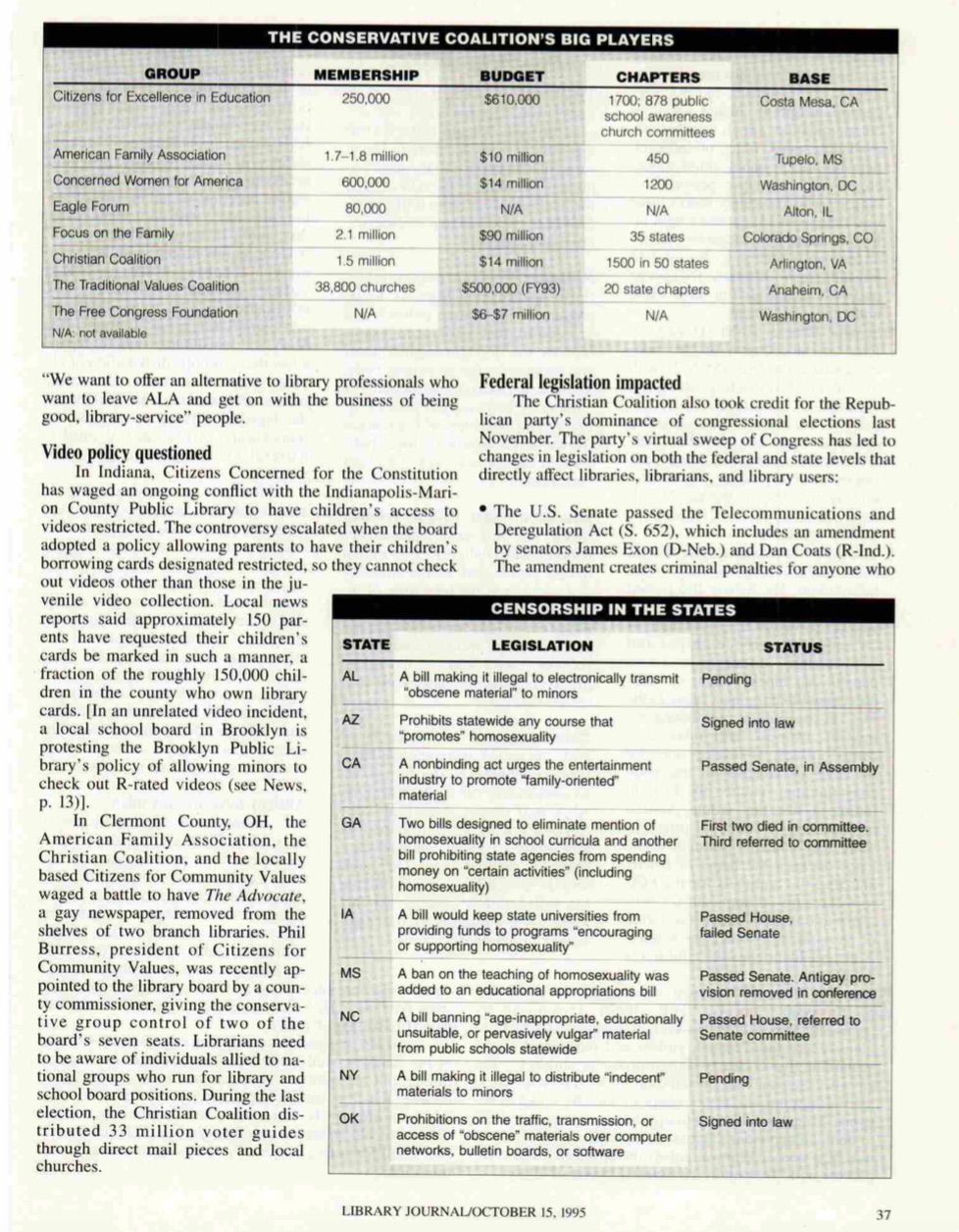It’s National Library Week, and as is tradition, the American Library Association (ALA) highlighted the top ten books challenged in the U.S. over the last year. The list, which includes the reasons for those book challenges, shows what has been clear for over a decade: books with queer characters, characters of color, or book written by queer or authors of color are most challenged.
In addition to rolling out the official list, ALA also launched a new landing page called Unite Against Book Bans. This “national initiative to empower readers everywhere to stand together in the fight against censorship” offers some of the statistics collected by the organization’s Office for Intellectual Freedom.
But what’s missing on this new website is any call to action. There are no steps or tools anyone can take to combat censorship in their own community. Instead, visitors are invited to sign up for a mailing list for updates from United Against Book Bans. What those updates might be remains a mystery. It is hard to “raise your voice” by signing up for news updates without any indication of what those news updates might be, and it’s certainly not a tool for speaking up — no letters go to legislators in defense of the freedom to read.
More troubling, though, is that the only other action available on the website is the donate. Donations look like they will go toward the campaign against book challenges, but in fact go to ALA’s 21st Century Fund: a fund without restrictions that can be used for anything within the organization’s purview. Will it go to creating educational resources for fighting book bans? Maybe. It could also go toward creating graphics used to market the sale of banned books swag from their store or toward scholarships that are unrelated to book challenges. None of these are bad, per se, but it’s deceptive to the average “reader” who is begging for some kind of direction to take.
In the 1990s, a tremendous wave of book challenges and bans were under way across the country. Focus on the Family and associated arms of that organization coordinated broad censorship, and in response the ALA offered robust, freely available information to readers about not only the challenges, but where they were coming from and what library workers could do to stand up for themselves and their organizations.

The above is not being shared by ALA in today’s censorship environment, but it is being done by several other organizations whose work is not focused on book or challenges. It’s unfortunate that the premier organization dedicated to intellectual freedom and the principals of free speech and freedom to read is no longer being that. Today’s ALA, which so many turn to as a trusted source of information — they are, in fact, founded on the principals of providing just that, as any library is — puts more and more of this information behind walls. Instead of giving access to vital information for how libraries can act now and can empower their patrons to act, they put up a newsletter sign up and a button to donate to a general fund.
For National Library Week, instead of empowering library workers with support they need, ALA offers a splashy webpage with links back to their own brand. What might be more useful, though, is freely accessible information with steps and actions library workers and library advocates could take right now to ensure that their right to read and access information remains free. Talking points, sample responses to challenges, a list of organizations pushing for these book challenges and how they’re doing it, are just a handful of the things that would do far more good than signing up for an unknown newsletter.
Isn’t that what members pay for?
(It hasn’t been lost on authors who “earned” the honors on this year’s most banned list and their advocates that the splashy graphic with the reasons why their books were challenged is going to be used as “proof” for why those books should be challenged).
For ways to take action against censorship, use this toolkit for how to fight book bans and challenges, as well as this guide to identifying fake news. Then learn how and why you may want to use FOIA to uncover book challenges.
Book Censorship News: April 8, 2022
- Palm Beach County, Florida, schools have pulled two books about transgender children, citing the “Don’t Say Gay” bill.
- Polk County Florida schools will keep 19 Minutes and Beloved in high school libraries.
- In Fredericksburg, Texas, Me and Earl and the Dying Girl and Perks of Being a Wallflower are being challenged.
- In Wake County, North Carolina, people continue to protest at school board meetings over books like Gender Queer. This time they brought signs with QR codes that direct to books they don’t like. Bonus shot of the professional “we are the majority” signage at the protest.
- This piece does not name the book in question, but one parent complained about a book in Warren County High School, so the book was pulled from the library for that parent to review. That…is still censorship, even if the intent is to return it to shelves once they’re done “reviewing” it.
- In Keller, Texas, parents continue to complain about books in the school libraries and that the board isn’t removing enough of them.
- Gender Queer is back on library shelves in the Antioch, Illinois, school district.
- “We do not allow Playboy or Hustler or Maxim or Penthouse in our schools, or in our public libraries for that matter,” said a mom complaining about Gender Queer and Lawn Boy in Adams Schools in Colorado.
- This is not the first time I’ve seen a similar story lately: someone is moving books around in Sharpsburg, Pennsylvania’s public library in a censorship attempt.
- In Wilson County, Tennessee, schools, Eleanor and Park and The Bluest Eye will remain available in the high school library. The first will be available but restricted in the middle school, while Morrison’s book is not in the middle school library.
- Maus and Maus II will remain in Katy, Texas, middle and high school libraries.
- Parents continue to complain to the Cherokee County, Georgia, school board about books in the libraries. Several are already being reviewed per policy.
- Monte Vista, Colorado, schools will keep The Hate U Give on library shelves.
- In Montgomery High School in New Jersey, parents have complained about Tomboy by Liz Prince and Dashka Slater’s The 57 Bus.
- A decision on Gender Queer‘s availability in Hudson High School in Ohio is expected at the next regular board meeting (and it looks positive).
- “I wish that these authors, if they really want to make a point to these young people, they would clean it up,” Craven said. This is a quote from the chair of the school board of Burke County Public Schools in North Carolina.
- This story out of ROWVA (Illinois) schools is absolutely bananas. The article gives the full background but the tl;dr is that The Hate U Give was challenged in November, upheld by the board, then the teacher using the book and the board members who defended it all resigned. Now there are 11 candidates for two open board positions.
- Placentia-Yorba Linda schools in California have banned “critical race theory.”
- “I’m saying either our city council stands with God, or you don’t,” said Pella resident Katherine Bogaards. Speaking of bananas stories, the good folks in Pella, Iowa, continue to harass their public library.
- This letter to the editor from a censor is worth sharing because of how extreme his behavior is when he doesn’t get his way. This is out of Rhode Island.
Also In This Story Stream
- Technology for Parent Monitoring of Student Library Use is Being Developed by Follett: This Week’s Book Censorship News, April 1, 2022
- The Censorship Story I Can’t Tell You: This Week’s Book Censorship News, March 25, 2022
- What Are Obscenity Laws?: Book Censorship News, March 18, 2022
- Why Didn’t The New York State Education Department Defend Its State Librarian?: This Week’s Book Censorship News, March 11, 2022
- How Much Does a Book Challenge Cost?: This Week’s Book Censorship News, March 4, 2022
- Take One Step This Week Toward Combating Censorship: This Week’s Book Censorship News, February 25, 2022
- How Faith-Based, Right-Wing Money Is Waging War Through Book Challenges: Book Censorship News, February 18, 2022
- Is a Curriculum Update a Book Ban?: This Week’s Book Censorship News, February 11, 2022
- Book Sales, Promotion, and Donations Don’t Solve Censorship: This Week’s Book Censorship News, February 4, 2022
